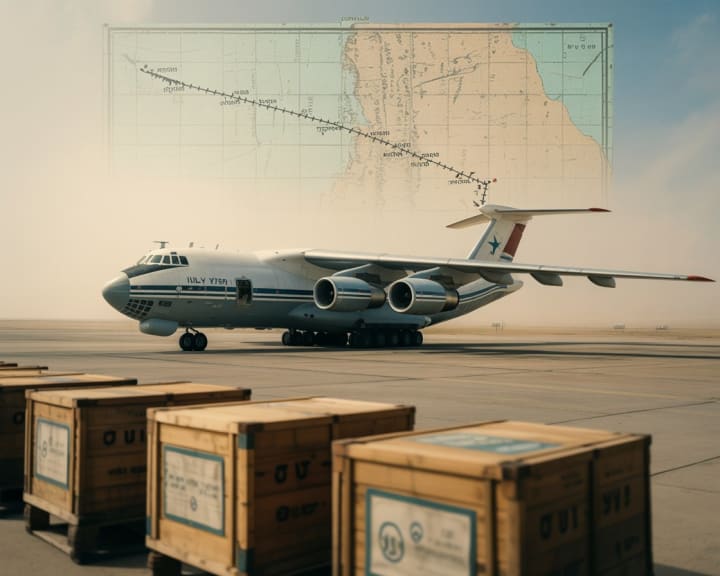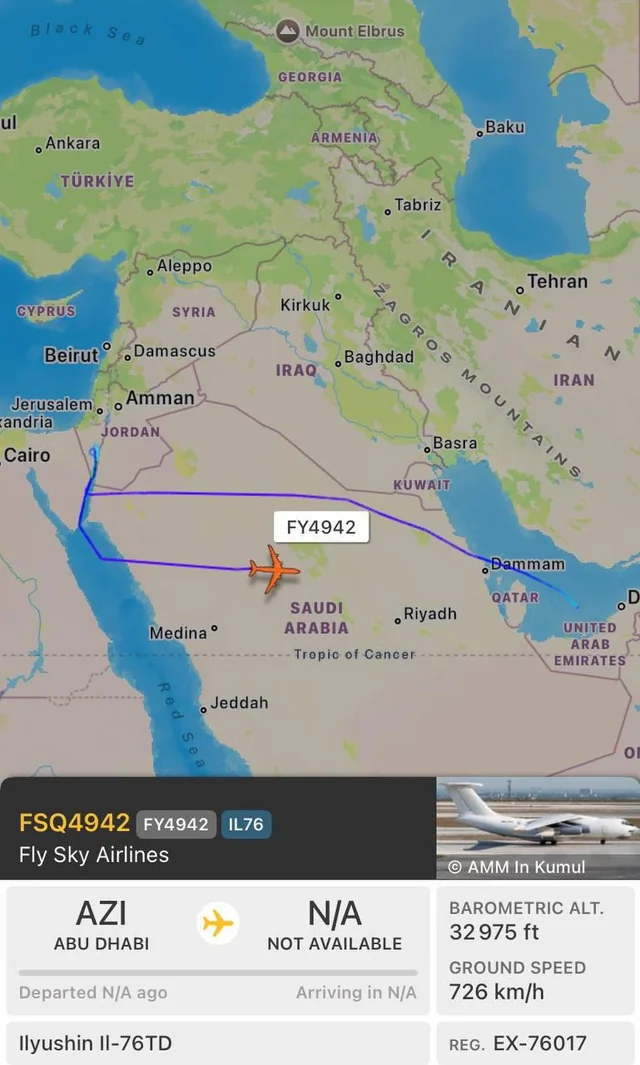In what could signal a watershed moment in Middle Eastern diplomacy and military dynamics, the United Arab Emirates has reportedly delivered weapons to Israel — a move that, if confirmed, would represent the first public transfer of military equipment between the two nations since the signing of the Abraham Accords in 2020.
The transfer, shrouded in secrecy and loaded with symbolism, has raised questions about the changing face of regional alliances and the potential fallout from such a bold move.
An Aircraft, a Detour, and a Silent Confirmation
Earlier this week, an Emirati military transport aircraft, identified as flight FY4942, landed at Israel’s Ramon Airport in the Negev Desert. According to multiple sources familiar with the matter, the plane was carrying military equipment. The delivery marks what analysts believe to be the first-ever overt weapons shipment from the UAE to the State of Israel.
What set the operation apart from a typical delivery, however, was not merely the cargo it carried — but the route it took to get there. The Il-76 military aircraft avoided Jordanian airspace entirely, despite Jordan maintaining diplomatic ties with both the UAE and Israel. Instead, the plane diverted through what are believed to be Egyptian or Saudi-controlled corridors, extending its flight duration and raising eyebrows among regional observers.
“This wasn’t a routine cargo flight,”
said Dr Omar Zidan, a regional aviation analyst based in Istanbul.
“For a military aircraft to reroute around Jordan, particularly during such a politically charged delivery, tells us that behind the scenes, not everyone is on board with what’s happening.”
What Was in the Cargo Hold?
The governments of Israel and the UAE have so far declined to officially comment on the nature of the delivery. The Israeli Defense Forces (IDF) have provided no statement regarding the flight, and Abu Dhabi has remained tight-lipped in the face of mounting speculation. Yet, multiple open-source intelligence channels have verified the flight’s arrival and unloading, while eyewitnesses reported seeing heavy security around the aircraft on the tarmac at Ramon Airport.
The absence of official acknowledgement has only intensified speculation. Analysts believe that rather than conventional heavy weapons, the cargo likely included tactical systems or precision-guided munitions — the sort of equipment that can quietly shift battlefield advantages without attracting immediate international outcry.
“The UAE is signaling a new level of commitment to its alliance with Israel,”
said Yael Ben-Meir, a defence analyst based in Tel Aviv.
“This kind of move does not happen without strategic calculation. It’s about more than weapons — it’s about posture.”
Beyond Normalisation: A New Phase?
Although military cooperation between Israel and the UAE has long been suspected in the realms of intelligence and cyber-security, a direct arms shipment marks a significant escalation — and a public one at that.
Since the Abraham Accords formalised diplomatic relations, both countries have engaged in bilateral ventures spanning tourism, energy, and technology. But the leap from commerce to military cooperation — particularly in a form as tangible as an arms shipment — suggests that the relationship is entering a more assertive phase.
This calculated shift raises difficult questions about the risks involved. Could the UAE’s new approach threaten its relationships with other Arab countries? Could it draw the ire of regional publics already sceptical of warming ties with Israel?
“This could backfire for the Emiratis,”
warned Lina Dabbous, a political scientist at the American University of Beirut.
“Any Arab country seen directly supplying Israel with weapons risks a major blow to its public image, particularly if those weapons are used in Palestinian territories.”
Criticism has already begun to surface online, particularly on social media platforms in the Arab world. Some commentators have labelled the UAE’s actions a betrayal of regional solidarity, while others have called for transparency from both governments.
Silent Corridors and Diplomatic Signals
The rerouted flight path serves as a story in its own right. While overflight permissions are often granted for civilian aircraft, military flights — especially those involving arms — tend to require explicit diplomatic clearances. The avoidance of Jordanian airspace was not only a logistical adjustment but a geopolitical message.
“It’s a red line that many Arab countries never expected to be crossed,”
remarked Hussein Marwan, a former Jordanian diplomat.
“What happens next could reshape alliances across the Middle East.”
Though Jordan has offered no official comment on its airspace denial, the move is being interpreted as a quiet distancing from the transaction — a way of expressing discomfort without direct confrontation.
A Calculated Risk in a Volatile Region
This reported transfer comes at a moment of escalating instability in the region. Israel is continuing to clash intermittently with Iranian-backed militias in Lebanon and Syria. The Red Sea and Persian Gulf are witnessing increased naval tension, and the geopolitical chessboard between Tehran, Washington, and their respective allies remains highly active.
The UAE, for its part, has walked a fine line — seeking to position itself as both a modernising power aligned with the West and a country that respects Arab consensus on sensitive issues like Palestine. This delivery, if verified, could strain that balance.
It is too early to say whether this was a solitary shipment or the first in a series of strategic transfers. The implications, however, are significant. The decision to support Israel militarily — not merely diplomatically or economically — reflects a notable shift in Emirati foreign policy.
Even as governments remain silent, the symbolism is loud.
“It’s about changing the regional landscape,”
said Ben-Meir.
“The UAE is telling the world, and the region, that it is prepared to take risks to shape the future of the Middle East on its own terms.”


















